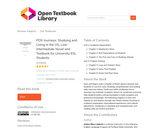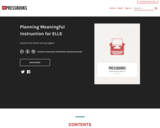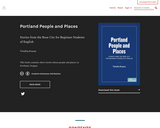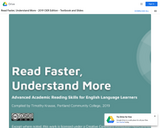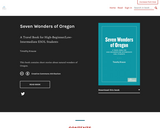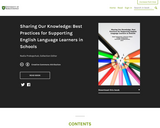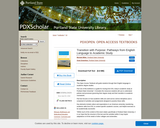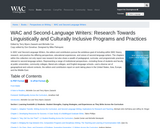Table of Contents:
PART ONE Understanding the Roles of Language and Content
Chapter 1 Academic success: Learning the language of school
Key Issues
The language of school
Social language
Everyday aspects
Intercultural aspects
Instructional aspects
Academic language
Word/phrase level
Sentence level features
Discourse level features
The developmental nature of academic language
A comparison of social and academic languages
The BICS/CALP distinction
Connection between BICS/CALP and the language of school
Extensions
For Reflection
For Action
References
Chapter 2 Language proficiency and communicative competence
Key Issues
Language proficiency
Language domains
Receptive language
Productive language
English language proficiency
Levels of language proficiency
Starting
Emerging
Developing
Expanding
Bridging
Communicative competence
Elements of communicative competence
The role of native languages and cultures
Translanguaging
Strategies for using the native language in the classroom
Extensions
For Reflection
For Action
References
PART TWO Components of Effective Lesson Design
Chapter 3 Assessing student strengths and needs
Key Issues
Background
Understanding strengths and needs
Collecting general information
Gathering information on learners’ language backgrounds
Understanding educational/academic background
Discovering content background and knowledge
Exploring cultural background
Guidelines for understanding student strengths and needs
Conclusion
Extensions
For Reflection
For Action
References
Chapter 4 Writing and teaching to language objectives
Key Issues
Background
Understanding objectives
Content objectives
Language objectives
Constructing language objectives
Teaching to the language objectives
Guidelines
Conclusion
Extensions
For Reflection
For Action
References
Chapter 5 Connecting to students’ lives
Key Issues
Background
Understanding connections
Making personal connections
Making academic connections
Building background knowledge
Integrating connections
Guidelines for making connections
Conclusion
Extensions
For Reflection
For Action
References
Chapter 6 Designing Engaging Tasks
Key issues
Background
Understanding engagement and tasks
Engagement
Elements of tasks
Elements of task process
Instructional grouping
Modes
Task structure
Time and pacing
Scaffolding
Resources/texts
Teacher/student roles
Procedural tools
Elements of task product
Pedagogical connections
Techniques for making pedagogical connections
Guidelines for task design
Conclusion
Extensions
For Reflection
For Action
References
Chapter 7 Assessing Tasks, Students, and Lessons
Key Issues
Background
Understanding assessment
Purposes of assessment
Assessing student process and product
Adapting traditional classroom assessments
Student roles in alternative assessments
Lesson examples
Homework
Additional guidelines for assessment
Assessing the lesson
Conclusion
Extensions
For Reflection
For Action
References
PART THREE Designing Lessons for Academic Success
Chapter 8 Unlocking the language of science
Key Issues
Potential challenges for ELLs in the science classroom
Science education: A focus on language
How do the NGSS define and shape academic language use?
The specialized language of science
Word/phrase level
Sentence level features
Discourse level features
Science textbooks
Language functions
Selected strategies for learning and talking science
Teaching students how to compare and contrast
Teaching the language of cause and effect relationships
Teaching Greek and Latin roots
Conclusion
Extensions
For reflection
For action
References
Chapter 9 Unlocking the language of mathematics
Key Issues
Potential challenges for ELLs in the mathematics classroom
Mathematics education and the Common Core State Standards
The specialized language of mathematics
Word/phrase level
Sentence level features
Discourse level features
Language functions
Teaching strategies for learning and talking mathematics
Conclusion
Extensions
For reflection
For action
References
Chapter 10 Unlocking the language of English language arts
Key Issues
Potential challenges for ELLs in the English language arts classroom
English language arts: Preparing students for the literacy demands of today and tomorrow
Multiliteracies
New literacies
Multimodalities
Effective literacy practices for ELLs in the elementary grades
Theoretical orientation
Additive perspective on language
Emphasis on academic language
Literacy strategies
The language of English language arts
English language arts Common Core State Standards
Word/phrase level
Sentence level features
Language functions
Discourse level features
Conclusion
Extensions
For Reflection
For Action
References
Chapter 11 Unlocking the language of social studies
Key Issues
Potential challenges for ELLs in social studies classrooms
About the field of social studies
National curriculum standards for social studies and CCSS
The specialized language of social studies
Word/phrase level
Sentence level features
Discourse level features
Difficulties presented by social studies textbooks and materials
Diverse written genres
Strategies for teaching and learning social studies
Developing socially supportive classrooms
Explicit teaching of academic skills
Reducing cognitive load and increasing accessibility of complex content knowledge
Conclusion
Extensions
For Reflection
For Action
References
Chapter 12 Putting it all together
Key Issues
Background
Understanding the whole
Lesson examples
Adapting lessons
Guidelines for creating and adapting lessons
References
Appendices
Answers to the Common Teacher Behaviors Questions
Making Your First Home Visit: A Guide for Classroom Teachers
A reproducible copy of Figure 7.7.
A copy of Figure 7.7 without the criteria
